Events
Economic Security Research Program (ESRP) at the Research Center for Advanced Science and Technology (RCAST) at The University of Tokyo, along with the NATO HQ and the Royal Danish Embassy Tokyo (NATO Contact Point Embassy), will co-host the "NATO-Japan Symposium 2024: Partnership in Uncertain Times."
Following the "NATO-Japan Symposium 2023: Emerging Security Challenges," we will once again convene experts from around the world to RCAST, The University of Tokyo to discuss how partner countries can collaborate with each other in the era where uncertainty reigns.
This year, we have the privilege of welcoming the Swedish Defense Minister to make a keynote speech. This will be followed by a discussion among NATO HQ experts, numerous Ambassadors (EU, Norway, Denmark, Romania), and Japan's Parliamentary Vice Minister of Defense, among others.
We will focus on 3 topics during the discussions. (1) Interconnectedness of the Euro-Atlantic and the Indo-Pacific; (2) Navigating uncertain times following the 2024 elections; New government, new threats, new responses; and (3) The Future of NATO-Japan and IP4 Partnership.
- Date Tuesday, December 3, 2024, 15:00-18:30 (Registration begins at 14:00)
-
Place
ENEOS Hall, Building #3-S, Komaba II Campus, Research Center for Advanced Science and Technology, The University of Tokyo
4-6-1 Komaba, Meguro-ku, Tokyo 153-8904 JAPAN [Access](https://www.rcast.u-tokyo.ac.jp/en/access.html) - Fee Free
-
Speakers
15:00 - 15:05 Opening Welcome [5 mins]
Masakazu Sugiyama (Director, RCAST, The University of Tokyo)
Pietro De Matteis (Programme Officer for the Indo-Pacific Engagements Section, Public Diplomacy Division (PDD), NATO HQ)
Kazuhiko Kobayashi (Parliamentary Vice-Minister of Defense, Japan)
15:05 - 15:30 Keynote Speech: Swedish perspective on NATO [25 mins]
Keynote speech (5-10 mins)
H.E. Pål Jonson (Minister for Defence, Sweden)
Moderated discussion / Q&A (15-20 mins)
Akira Igata (Project Lecturer, RCAST, The University of Tokyo)
15:30 - 16:20 Session 1: Interconnectedness of the Euro-Atlantic and the Indo-Pacific [50 mins]
Panelists
Junjiro Shida (Associate Professor, Meio University) [Okinawan perspective]
Pietro De Matteis (Programme Officer for the Indo-Pacific Engagements Section, Public Diplomacy Division (PDD), NATO HQ) [NATO perspective]
H.E. Jean-Eric Paquet (Ambassador, EU Delegation to Japan) [EU perspective]
Henrik Landerholm (Swedish National Security Advisor) [European perspective]
[Moderator]
Jakub Janda (Director, European Values Center for Security Studies)
16:20 - 16:40 Coffee break
16:40 - 17:30 Session 2: Countering threats of disinformation [50 mins]
Amy Ertan (Cyber and Hybrid Policy Officer, NATO HQ) [NATO perspective]
Masakazu Takamori (CEO, Japan Nexus Intelligence) [Japanese perspective on disinformation threats and responses]
Maya Sobchuk (Project Academic Specialist, RCAST, The University of Tokyo) [China-Russia nexus in disinformation]
Aaron D. Snipe (Minister Counselor for Political Affairs, U.S. Embassy Tokyo) [Nexus of the Euro-Atlantic and the Indo-Pacific perspective]
[Moderator]
H.E. Ovidiu-Alexandru Raețchi (Ambassador, Embassy of Romania to Japan)
17:30 - 18:20 Session 3: The Future of NATO-Japan and IP4 Partnership [50 mins]
Takeshi Sakade(Professor, Graduate School of Economics, Kyoto University) [Japanese perspective]
Bo Ram Kwon (Research Fellow, Korea Institute for Defense Analyses (KIDA)) [Korean perspective]
Corey Wallace (Associate Professor, Kanagawa University) [NZ perspective]
Claire Elias (Minister-Counsellor (Political), Australian Embassy Tokyo) [Australian perspective]
[Moderator]
H.E. Kristin Iglum (Ambassador, Norwegian Embassy in Tokyo)
18:20 - 18:30 Closing Remarks
H.E. Jarl Frijs-Madsen (Ambassador, Royal Danish Embassy in Japan) - Language English (Japanese-English simultaneous interpretation is provided)
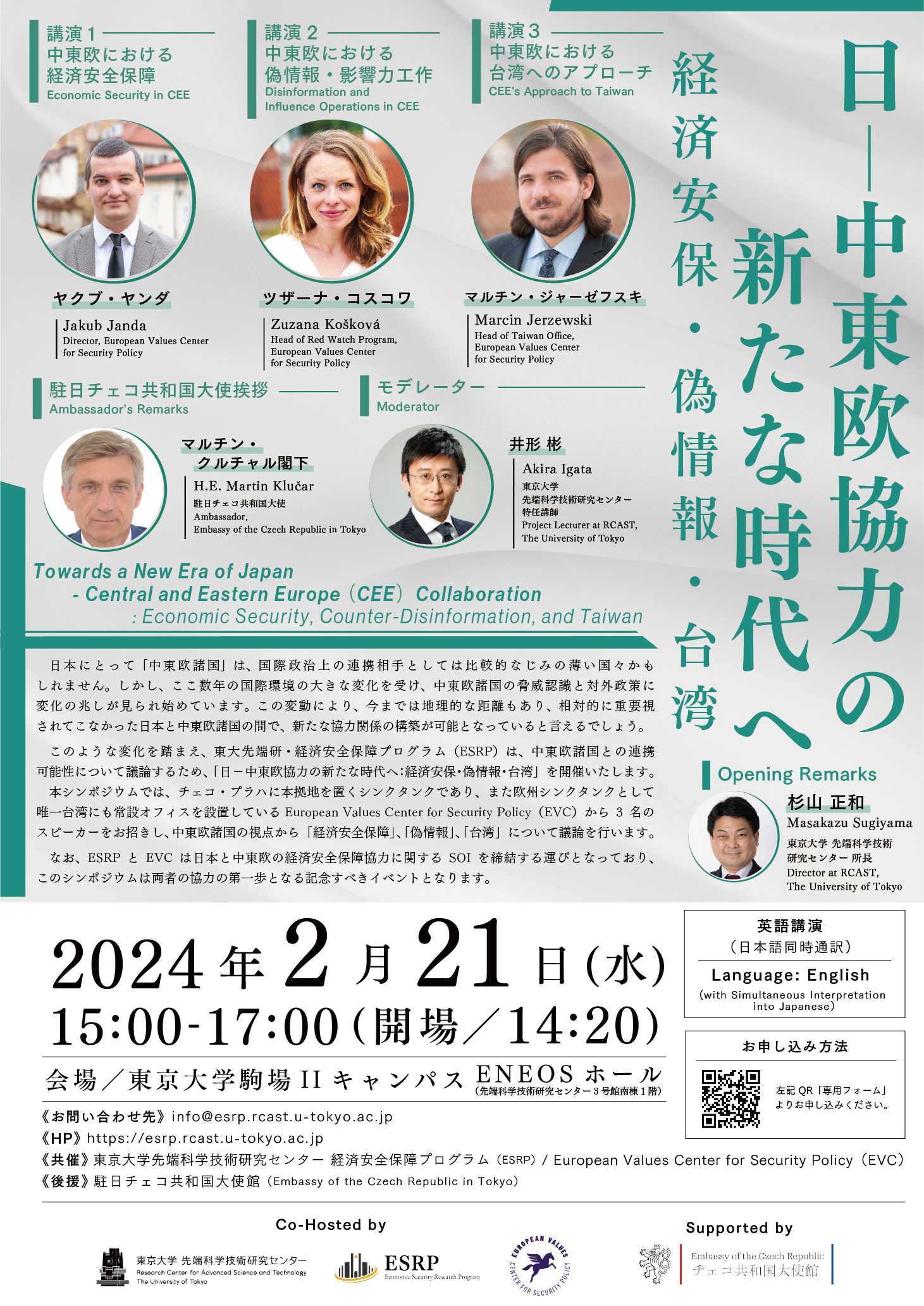
The relationship between Japan and Central and Eastern Europe (CEE) has been one of the underexplored areas in international politics. However, the threat perception and foreign policy of the CEE states are changing due to the dramatic shift in the global security environment. This change has opened up new possibilities for cooperation between Japan and CEE countries.
ESRP is proud to invite three speakers from the European Values Center for Security Policy (EVC), a Prague-based think tank and the only European think tank with a permanent presence in Taiwan. The three speakers will discuss "Economic Security," "Disinformation," and "Taiwan" from the perspective of the CEE countries. This will be followed by a moderated discussion and a Q&A with the audience.
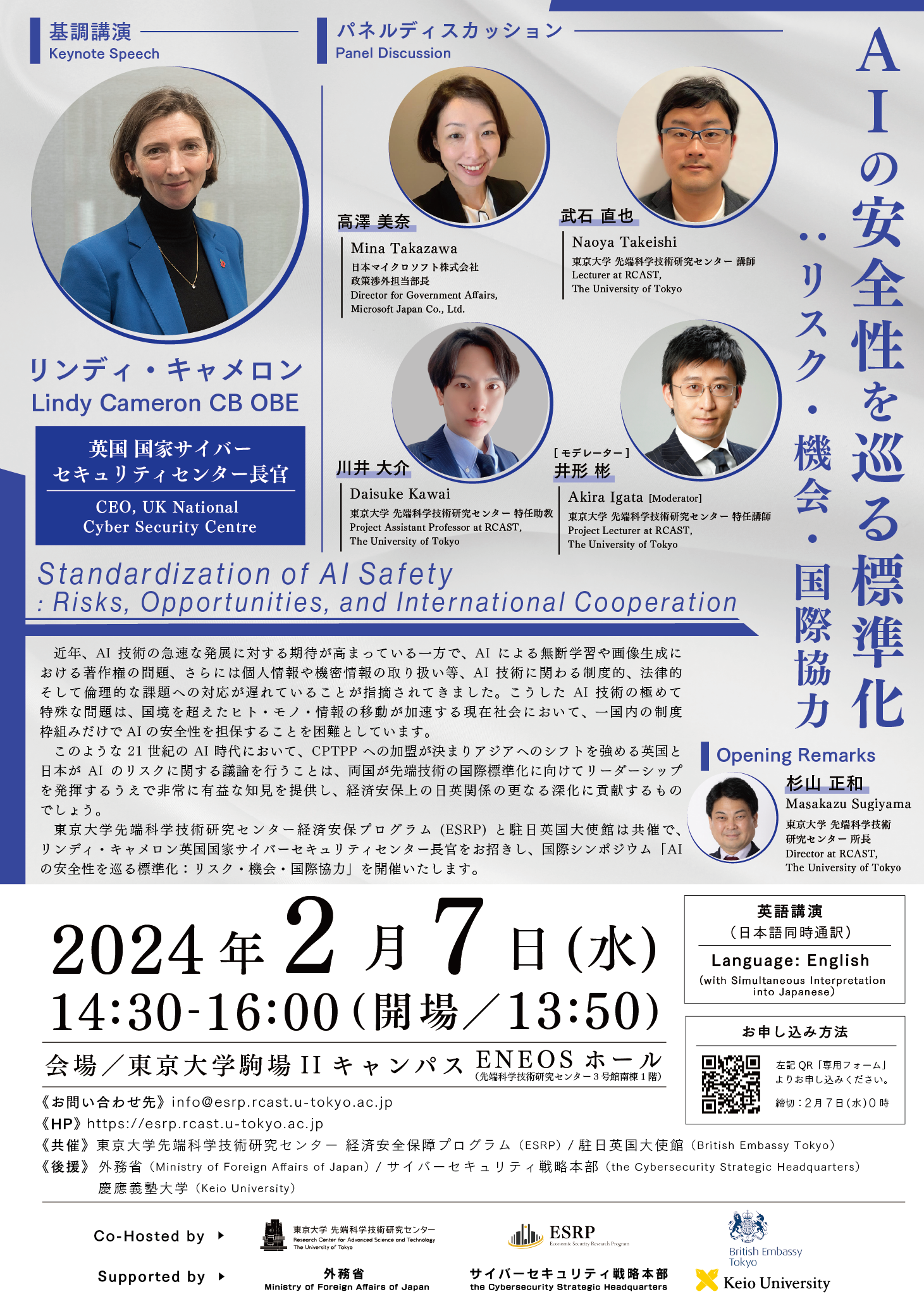
In recent years, while AI technology has rapidly developed, there have been concerns about unauthorized learning by AI, copyright issues in AI-generated images, and the handling of personal and confidential information by AI. These concerns point to delays in addressing institutional, legal, and ethical challenges related to AI technology. The extremely unique problems of AI technology are becoming increasingly difficult to manage within the framework of a single country's systems, especially in our current society where the movement of people, goods, and information across borders is accelerating.
In this 21st century era of AI, the United Kingdom, which is intensifying its shift towards Asia and is on the verge of joining the Trans-Pacific Partnership (TPP), and Japan, will discuss the risks associated with AI. This discussion is expected to be highly beneficial in providing insights for both countries to take leadership in forming rules regarding AI.
In an era of deepening Japan-UK relations, which could be called the 'Rebirth of the Anglo-Japanese Alliance', the Economic Security Research Program (ESRP) at RCAST, The University of Tokyo, and the British Embassy Tokyo will co-host a symposium. The symposium, titled 'Standardization AI Safety: Risks, Opportunities, and International Cooperation,' will be held on February 7th, and will feature Lindy Cameron CB OBE, CEO of the National Cyber Security Centre, as a keynote speaker.
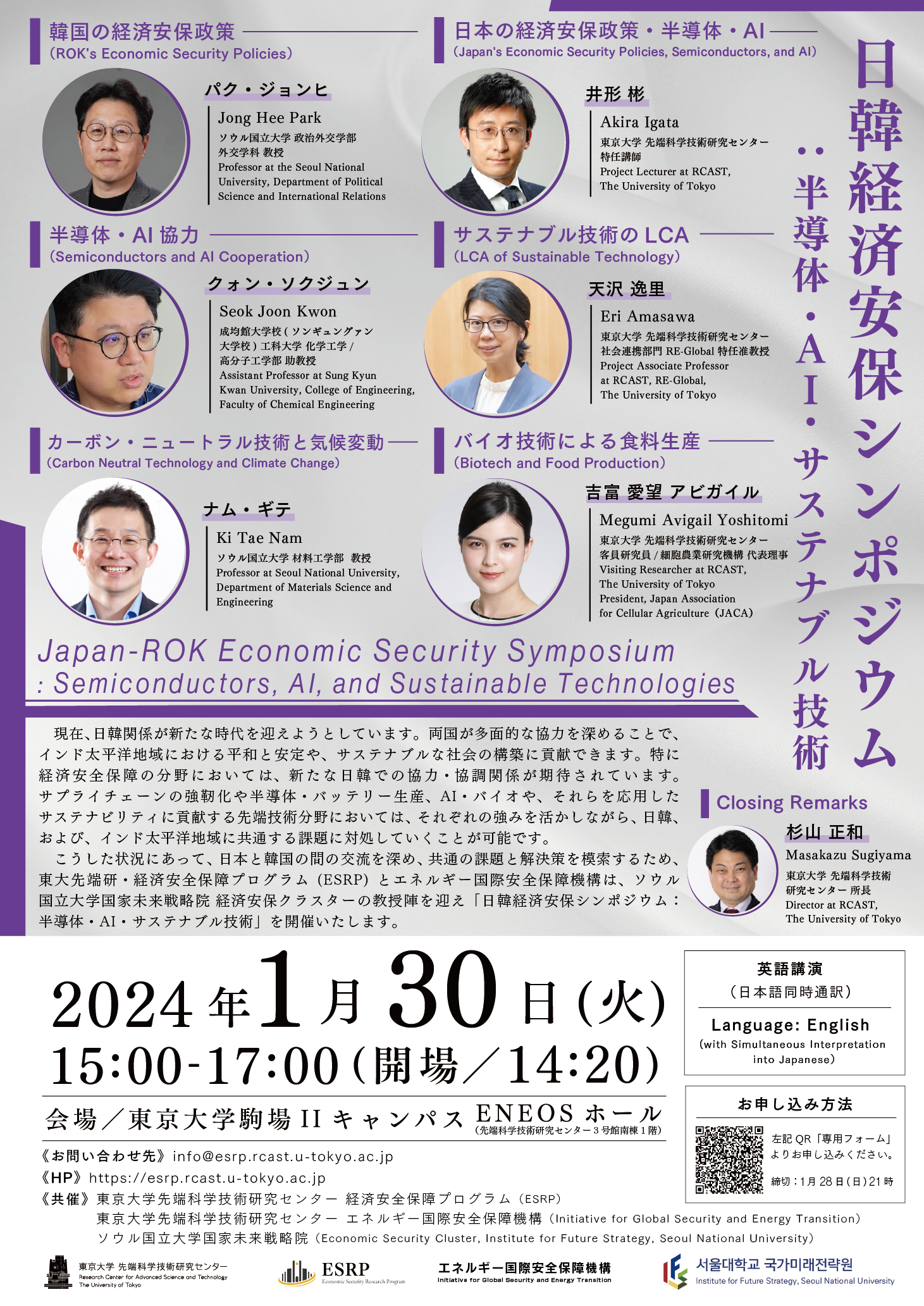
The Japan-ROK relationship is on the brink of a new era. Both nations can significantly contribute to peace and stability in the Indo-Pacific region and the creation of a sustainable society by deepening multifaceted cooperation.
In this context, to deepen exchanges between Japan and South Korea and explore common issues and solutions, the Economic Security Research Program (ESRP) and the Initiative for Global Security and Energy Transition at RCAST, The University of Tokyo welcomes the faculty members from the Economic Security Cluster at the Institute for Future Strategy (IFS), Seoul National University, to co-host an in-person public symposium titled "Japan-ROK Economic Security Symposium: Semiconductor, AI, and Sustainable Technologies" from 15:00-17:00 on January 30.
【ROK's economic Security Policies】
- Jong Hee Park (Professor, Department of Political Science and International Relations, Seoul National University)
【Semiconductors and AI Cooperation】
- Seok Joon Kwon (Assistant Professor, School of Chemical Engineering, Sungkyunkwan University)
【Carbon Neutral Technology and Climate Change】
- Ki Tae Nam (Professor, Material Science and Engineering, Seoul National University)
【Japan's Economic Security Policies, Semiconductors, and AI】
- Akira Igata (Director of ESRP / Project Lecturer, RCAST, The University of Tokyo)
【LCA of Sustainable Technology】
- Eri Amasawa (Project Associate Professor, RCAST, RE-Global, The University of Tokyo)
【Biotech and Food Production】
- Megumi Avigail Yoshitomi (Visiting Researcher, RCAST, The University of Tokyo / President, Japan Association for Cellular Agriculture (JACA))
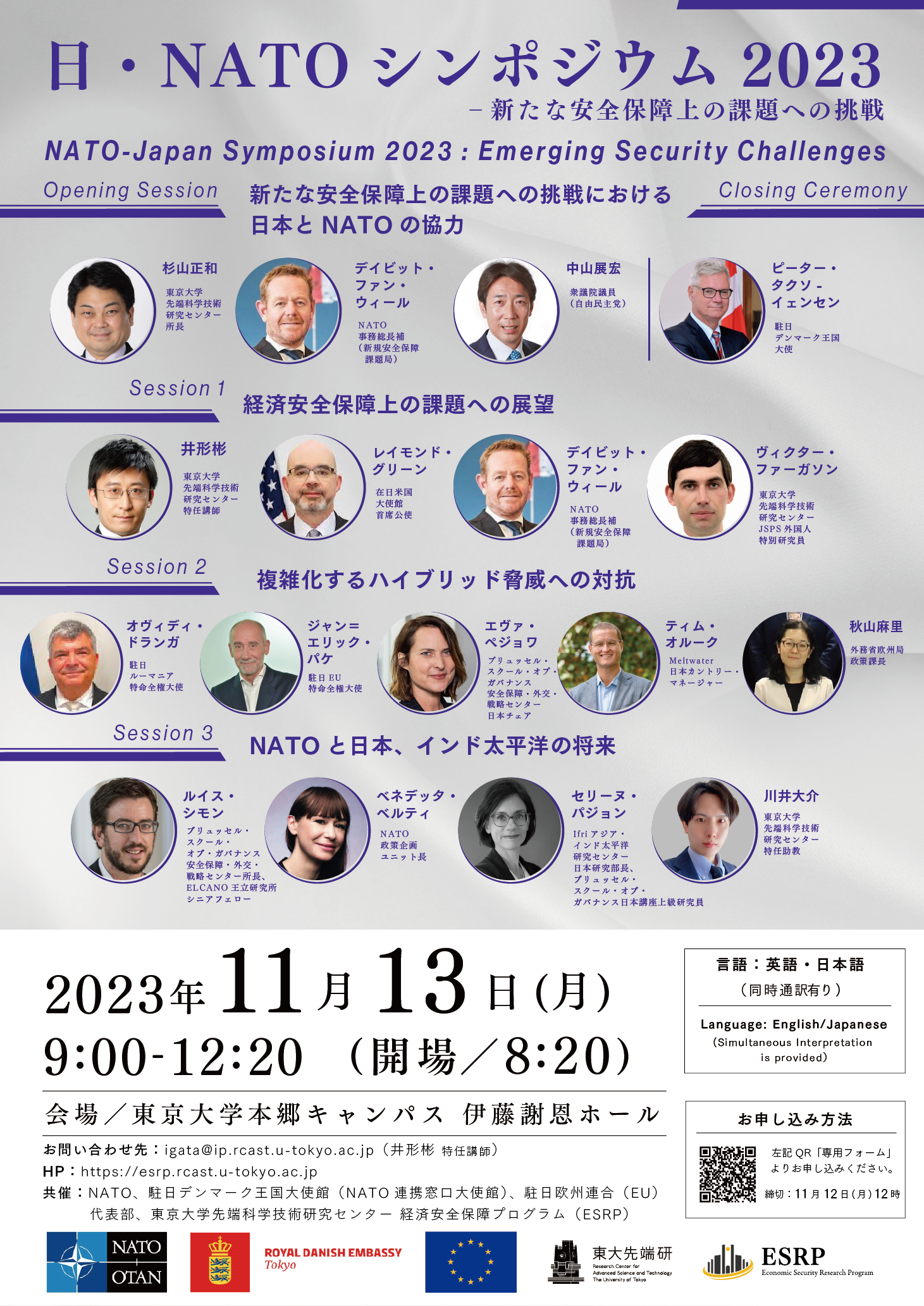
The world is facing upheaval due to global challenges, including China's military build-up, Russia's aggression in Ukraine, Middle East tensions, and North Korea's nuclear program.
Japan, along with Australia, South Korea, and New Zealand, participated in NATO's summit, highlighting close cooperation between NATO and the Indo Pacific. The Individually Tailored Partnership Programme for 2023-2026 strengthens collaboration between NATO and Japan to promote international peace, stability, and the rules-based international order. This partnership focuses on addressing security challenges like economic security, cyber-attacks, emerging technologies, and building resilient societies to protect populations and territories.
The Japan-EU Economic Partnership Agreement was entered into in 2019 to enhance our economic cooperation as a model of economic order in the 21st century based on free and fair rule. We also launched a strategic dialogue on security issues and laid the groundwork for closer cooperation in the areas of economic security, in particular on emerging technologies, supply chain diversification and anti-coercion measures.
Against this backdrop, Japan-EU-NATO Symposium 2023 will take place on 11/13, co-hosted by NATO, EU, Royal Danish Embassy and Economic Security Research Program (ESRP) at Research Center for Advanced Science and Technology (RCAST). In this event, we will discuss issues related to Economic Security, Cognitive Warfare, and partnership between Japan and NATO.
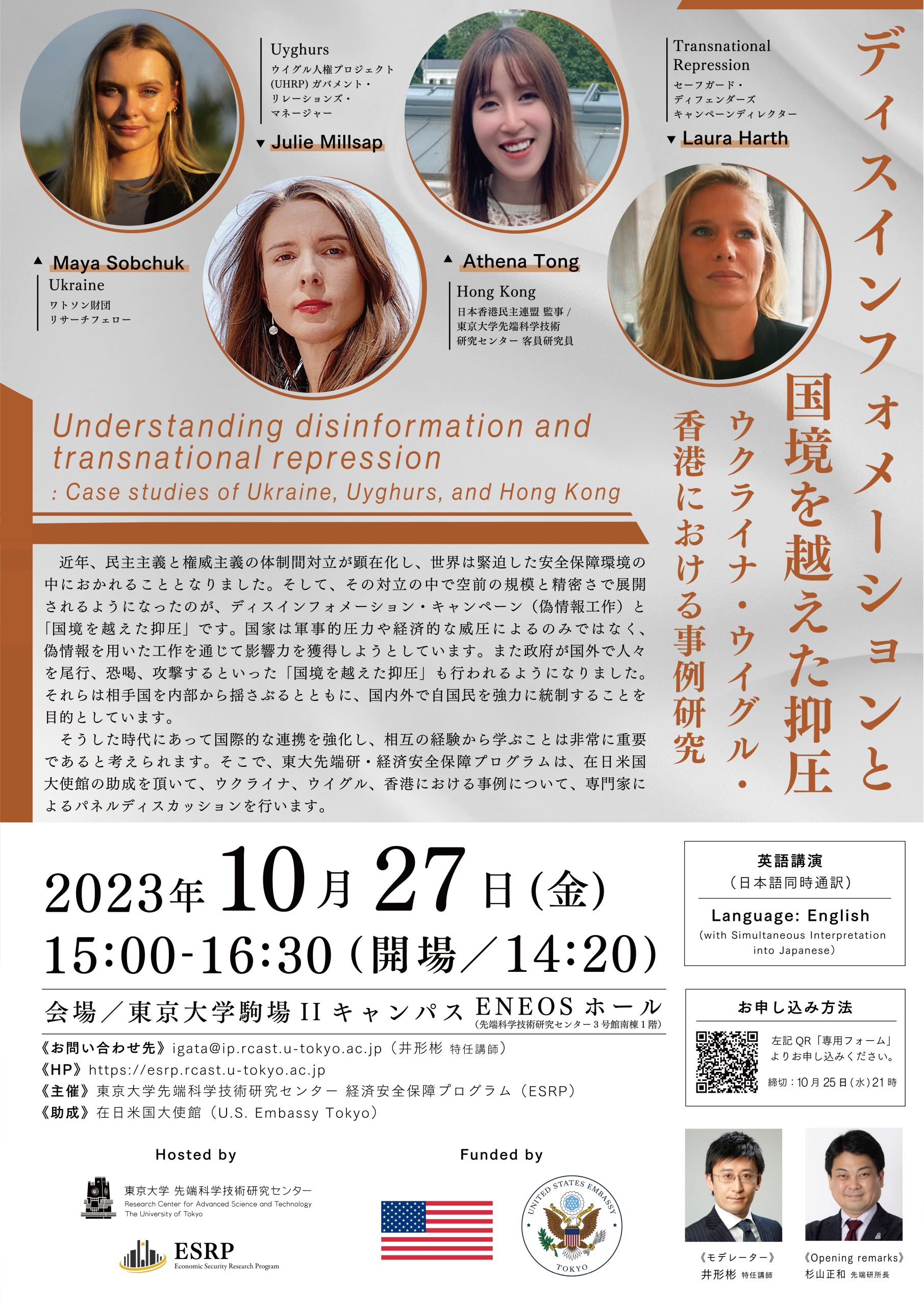
The Economic Security Research Program (ESRP) at the Research Center for Advanced Science and Technology (RCAST), the University of Tokyo hosted a symposium titled “Understanding Disinformation and Transnational Repression: Case Studies of Ukraine, Uyghurs and Hong Kong” on 27 October 2023.
The symposium featured the Government Relations Manager at The Uyghur Human Rights Project, Julie Millsap; Research Fellow at Watson Foundation Maya Sobchuk; Visiting Researcher at the Research Center for Advanced Science and Technology, University of Tokyo, Athena Tong; and the Campaign Director at Safeguard Defenders, Laura Harth.
After a welcome speech by Masakazu Sugiyama, the Director of RCAST, Adam Gallagher from the U.S. Embassy’s Public Affairs section gave some remarks, highlighting the importance of cooperation between the U.S. and Japan, especially in the face of mutual threats such as that of disinformation.
Following case studies and analysis presented by the speakers, a Q&A session was moderated by Akira Igata, Project Lecturer from the University of Tokyo. Discussions spanned from the role of states and social media platforms in combatting disinformation, to more contextual questions on Russia and China.
Our program stands dedicated to pioneering policy research in economic security, which includes combating foreign information manipulation and interference. Our mission is to fuse the swiftly advancing domains of science and technology with the ever-changing landscape of global politics, vital in shaping a more progressive society.
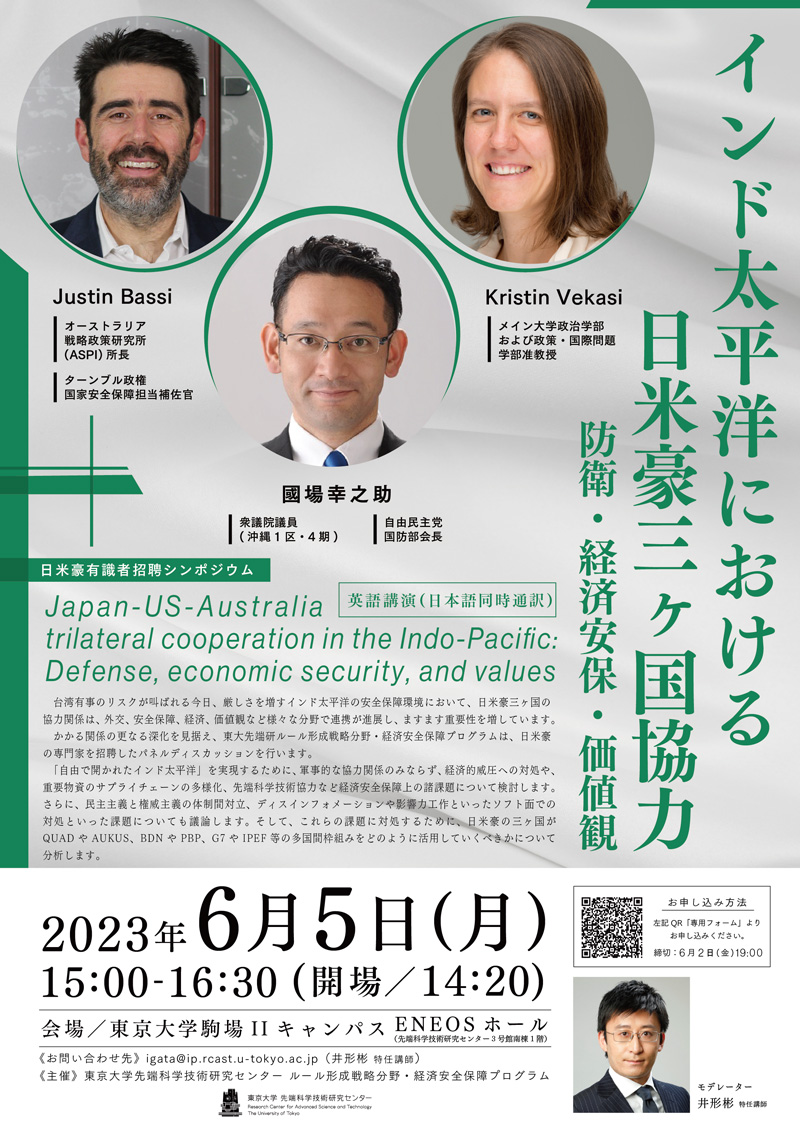
As the risk of a crisis over Taiwan is loudly voiced today, the tripartite relationship between Japan, the United States, and Australia is gaining increasing importance in the evolving security landscape of the Indo-Pacific. This relationship is expanding its collaboration in various fields such as diplomacy, security, economics, and values. With a view to further deepening this relationship, the University of Tokyo's Advanced Mizui Research in Rule Formation Strategy and Economic Security Program will host a panel discussion featuring experts from Japan, the U.S., and Australia.
To realize a "Free and Open Indo-Pacific," the panel will examine not only military cooperation but also address economic intimidation, diversification of critical supply chains, and collaboration in advanced science and technology as economic security issues. Furthermore, the panel will also discuss challenges related to the ideological conflict between democracy and authoritarianism, as well as tackling disinformation and influence operations on the soft-power front. The analysis will consider how the three countries should utilize multilateral frameworks like QUAD, AUKUS, BDN, PBP, G7, and IPEF to address these challenges.
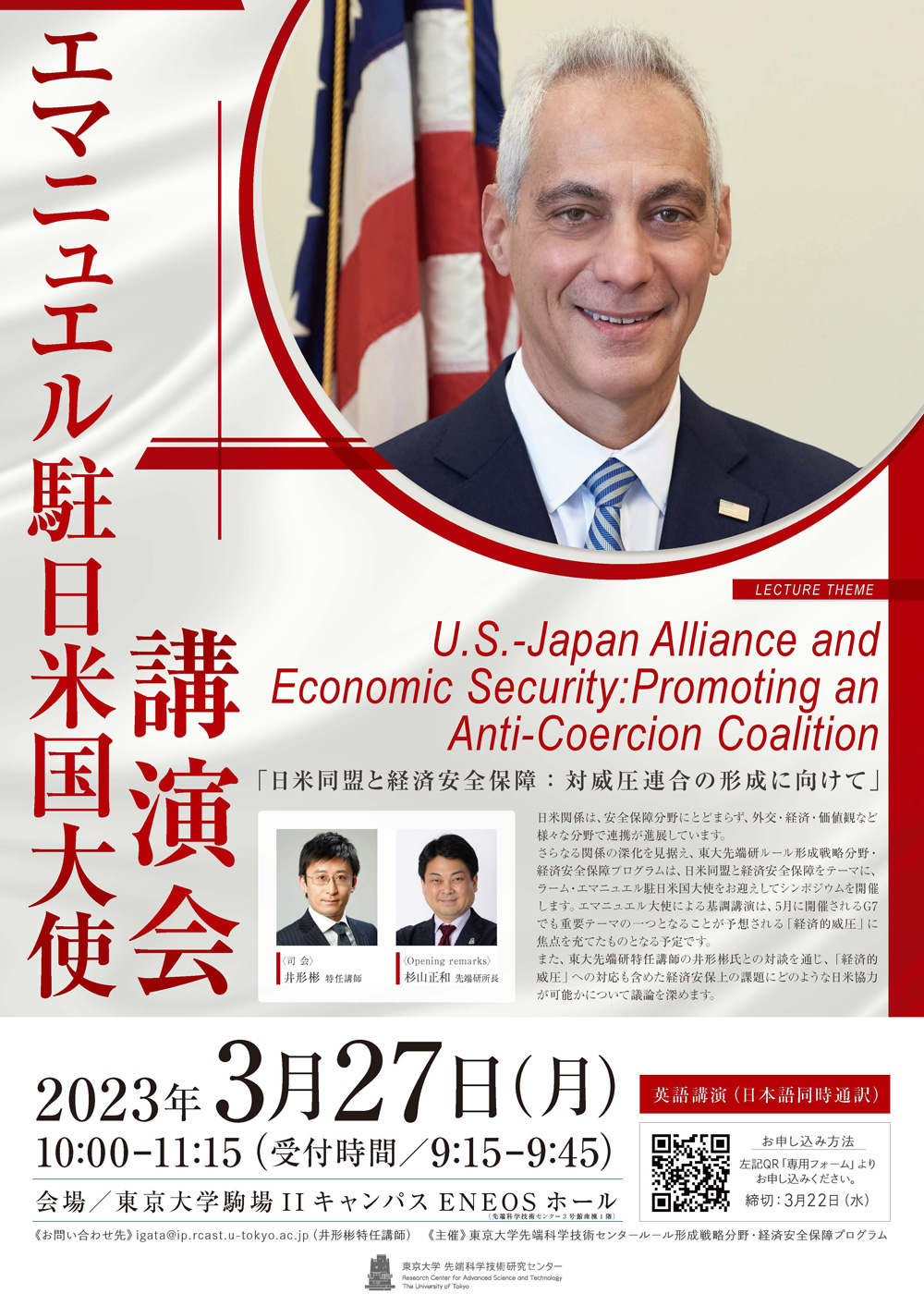
On Monday, 18 May 2023, the Economic Security Research Program (ESRP) at the Research Center for Advanced Science and Technology (RCAST), The University of Tokyo hosted a symposium. The event featured the Hon. Rahm Emanuel, the Ambassador of the United States to Japan, and was attended by more than one hundred people. The symposium comprised a keynote speech by Ambassador Emanuel, a subsequent discussion with Professor Akira Igata, Project Lecturer and Director of the ESRP, and a Q&A session with the audience.
Ambassador Emanuel held key positions in the U.S, including serving as a Member of the U.S. House of Representatives, Chief of Staff to the President during the Obama Administration, and Mayor of Chicago. He has been serving as the Ambassador of the United States to Japan since 2021.
After a welcome speech by Masakazu Sugiyama, the Director of RCAST, Ambassador Emanuel delivered his keynote address. He touched upon the content of his report on economic coercion, emphasizing that the current state of international relations has been significantly disrupted by factors such as COVID-19, Chinese coercion, and Russia's invasion of Ukraine. He further stressed the need for a collective defense against economic coercion, especially with regard to China.
Following his keynote, Ambassador Emanuel engaged in a discussion with Professor Igata and responded to questions from the audience. The discussion spanned a wide range of topics, including not only economic security but also Ambassador Emanuel's leadership during his tenure as Mayor of Chicago, his insights into Japanese domestic issues, and the merits of liberal democracy.
The content discussed during this symposium is reflected in the framework about economic coercion presented at the G7 Hiroshima summit.
Our program is deeply committed to cutting-edge policy research in the field of economic security. We endeavor to find solutions that harmonize the rapidly evolving realms of science and technology with the dynamic arena of international politics. Both elements are crucial in our pursuit of a better society.
Moving forward, our program will continue to facilitate dialogue with visionary societies through similar events centered on economic security.
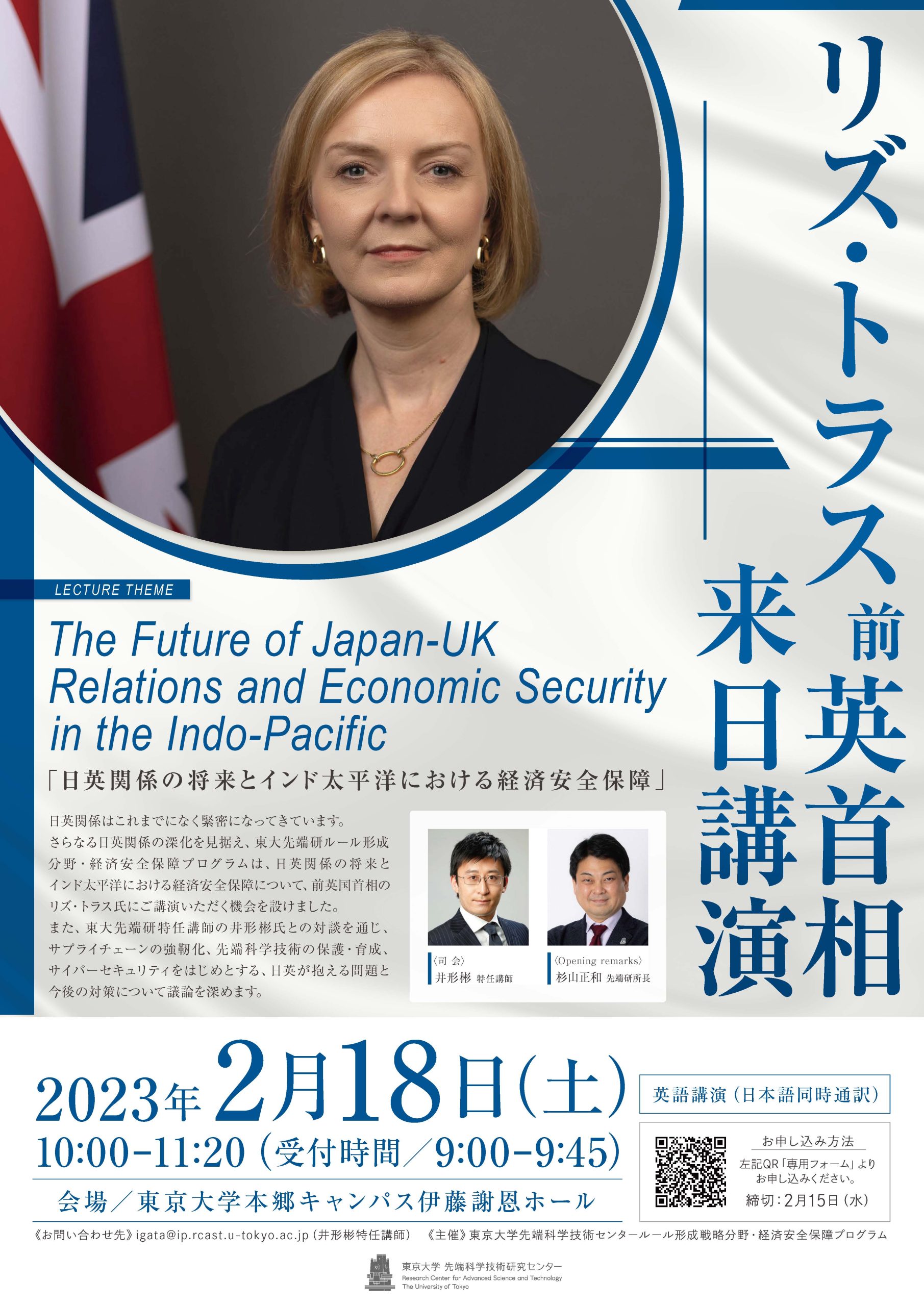
On Saturday, February 18, 2023, the Economic Security Research Program (ESRP) at the Research Center for Advanced Science and Technology, The University of Tokyo hosted a special lecture by Her Excellency Liz Truss, the former Prime Minister of the United Kingdom, at the Ito International Research Center's Ito Hall.
She served as the Secretary of State for Environment under the David Cameron administration, as the Secretary of State for Justice under the Theresa May administration and held positions as the Secretary of State for International Trade, the Foreign Secretary, and the Minister for Women and Equalities under the Boris Johnson administration. Subsequently, she served as the 78th Prime Minister of the UK. She swiftly finalized the Anglo-Japanese EPA after Brexit and made adjustments for the UK to join the CPTPP (Comprehensive and Progressive Agreement for Trans-Pacific Partnership) as the Secretary of State for International Trade. When she was the Foreign Secretary, she proposed the UK’s economic security policy as “The return of geopolitics” in the Mansion House Speech, which is held in the official residence of the Mayor of London, with invited financial sector professionals, thereby leading the discussion on economic security, a topic that has recently garnered attention.
After a welcome speech by Professor Masakazu Sugiyama, the Director of RCAST, she delivered her keynote speech. She provided insights into the future of Anglo-Japanese relations, the potential for cooperation in the Indo-Pacific in the realm of economic security and advocated for the establishment of an organization similar to NATO, but with a primary focus on the economy.
Following her keynote, she engaged in a discussion with Professor Akira Igata, Project Lecturer of RCAST and Director of the ESRP, and responded to questions from the audience. The discussion covered a wide range of topics, including the desired capabilities of national intelligence, details of the organization she proposed, and the possibility of her serving as Prime Minister again.
Our program is deeply committed to cutting-edge policy research in the field of economic security. We aim to find solutions that harmonize the rapidly evolving realms of science and technology with the dynamic world of international politics. Both aspects are essential in our pursuit of a better society. During the discussion, a comprehensive dialogue unfolded, covering both general and specific topics related to economic security.
Moving forward, our program will continue to facilitate discussions with visionary societies through similar events centered on economic security.
Mailing List
The earliest information about the latest event will be delivered.
Please register from the button below.

